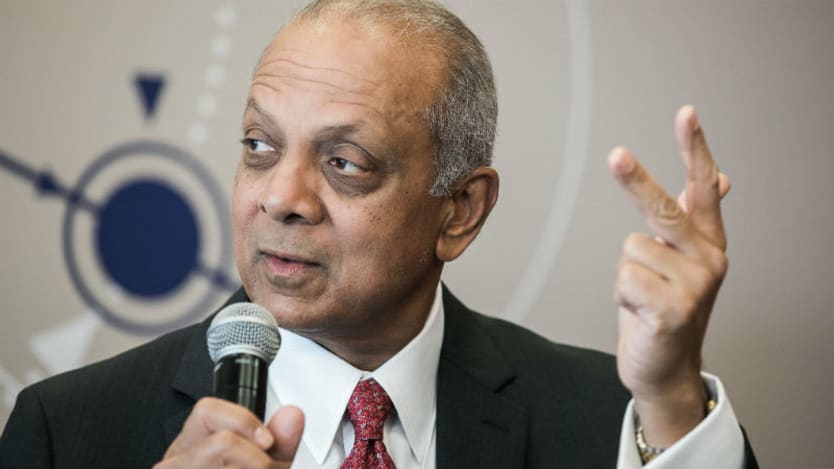
NEW YORK — On Wednesday, the Rockefeller Foundation announced a new effort to prevent 6 million maternal and child deaths in 10 countries by 2030.
Launched on the sidelines of the United Nations General Assembly, and on the heels of the U.N. High-Level Meeting on Universal Health Coverage, the $100 million Precision Public Health initiative aims to ensure that frontline health workers have access to data science tools such as predictive analytics, artificial intelligence, and machine learning.
“Data inequity is exacerbating health inequity.”
— Naveen Rao, managing director for health, the Rockefeller FoundationThis effort aligns with Rockefeller Foundation’s commitment to ensure the technologies that are transforming health in wealthy countries do not bypass the poor, according to Naveen Rao, the foundation’s managing director for health.

Activism. UHC. Climate. Read more of Devex's coverage from the 74th U.N. General Assembly.
“Data inequity is exacerbating health inequity,” he said, calling it “a moral outrage” that the social divide of the future will be data access rather than money.
“How do we close data inequity gaps to make this stick? How do we get political will? How do we get a diverse core set of partners that have never worked together before with a common unified objective?” he asked.
The Rockefeller Foundation explains in the framing of its health initiative that the data equity gap, and therefore the health equity gap, will only widen unless there are efforts to close it.
There have been efforts to bring data science to public health — on a smaller scale. Examples include putting risk maps in the hands of frontline health workers to direct them to the areas of greatest need and using non-health data such as social media trends to predict and respond to health emergencies.
Rao said the Rockefeller Foundation is approaching this initiative with scale in mind from the outset.
“This is not a pilot that we’re going to see if it works or not,” he said. “We know it will — we just need to make sure we bring the right partners, the right political will, the right mindset, the right financing, the right wherewithal, and the right capabilities along with the predictive analytic tools that we need to develop.”
Rockefeller is partnering with UNICEF to launch this initiative across primary and community health systems in India and Uganda. Rockefeller and UNICEF will draw on learnings from this effort to enable more decentralized decision making and near real-time monitoring as they expand from India and Uganda to eight additional countries by 2030.
Rao said it will be critical to partner not only with ministers of health, but also ministers of finance. The 6 million preventable maternal and child deaths that Rockefeller and its partners are focused on are “a moral indignation,” he said. But ministers of finance also see the economic argument for saving these lives and therefore may be willing to invest.
Other collaborators in the Precision Public Health initiative include the World Health Organization, the Global Fund, the Global Financing Facility, and Gavi, the Vaccine Alliance.
Rockefeller and UNICEF invited representatives from private sector companies, including Microsoft and Facebook, to join the panel at an event they are co-hosting Wednesday to announce their partnership — but there are no confirmed private sector partners in the Precision Public Health initiative.
Rao will be visiting the U.S. West Coast in mid-October to meet with several potential partners and will try to engage companies that have the capabilities the initiative will need to succeed.
When he thinks about a call to action for potential partners, Rao reflects on the words of Mahmoud Fathalla, a former president of the International Federation of Obstetricians and Gynaecologists.
In 2006, Fathalla said: “Women are not dying because of untreatable diseases. They are dying because societies have yet to make the decision that their lives are worth saving: We have not yet valued women’s lives and health highly enough.”
Advances in data science and technology can save the lives of those who are currently being left behind, as long as the world decides those lives are worth saving, Rao said. He outlined a few strategies he has learned over the years when it comes to effective partnerships.
The first is to make sure there is a genuine solution to a genuine problem, and he said the Precision Public Health initiative certainly meets these criteria. Second, “I want to make sure we build it within the systems that exist within countries,” Rao said. Finally, it’s about bringing partners together around a unifying goal, ensuring there is commitment at the highest level, and building trust in order to co-create with country partners.
Activism. UHC. Climate. Read more of Devex's coverage from the 74th U.N. General Assembly.
Search for articles
Most Read
- 1
- 2
- 3
- 4
- 5








